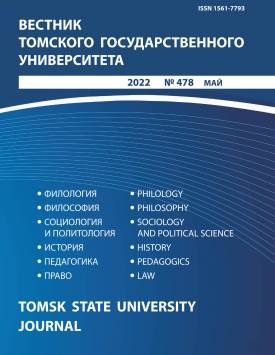Fyodor Dostoevsky in the late works of Mikhail Bakhtin
The author aims to outline the conceptualization of Mikhail Bakhtin's late works. Their essential moment is Bakhtin's specific attitude to works by Fyodor Dostoevsky and to literature as a special part of culture. In this connection, the author understands Bakhtin's philosophy as a philosophy of literature bordering on philosophical anthropology. In the article, using Bakhtin's writings, as well as a number of studies on his works, as material, the author intends to reconstruct the ontological basis of fiction, in the center of which lies the concept of grotesque Bakhtin developed in his book dedicated to Francois Rabelais. Despite the huge amount of literature on Bakhtin's oeuvre, there are no studies on his later works as a separate research space. This applies both to the corpus of texts, since part of the Bakhtin archive has not yet been published and lies in the manuscripts department of the Russian State Library, and to attempts to show the philosophical significance of Bakhtin's late writings by conceptualizing them and bringing them together into a separate intellectual phenomenon. The article attempts to analyze Bakhtin's later works through the prism of his attitude to Dostoevsky's works. The name of Bakhtin is not just associated with the name of Dostoevsky. The Russian philosopher revealed the ontology of Dostoevsky's works, and, since for Bakhtin Dostoevsky's works are the pinnacle of the development of literature, through Dostoevsky's works Bakhtin unfolds literature in its highest manifestation for us. The author substantiates the thesis that the understanding of Bakhtin's late works is based on the ontologization of grotesque, which Bakhtin himself indicates indirectly, not explicitly. The author also shows that Bakhtin sees literature, the subject matter of his research, as a purpose, as a special part of culture that reflects the ultimate embodiment of the human principle, and not an example in his theoretical constructions. Bakhtin's attitude to Dostoevsky is primarily reflected in his book about Dostoevsky in two editions. However, it would be wrong to reduce this attitude only to this book. In a broad sense, all of Bakhtin's philosophical works can be reduced to a certain hermeneutics of Dostoevsky due to the presence of a close and organic connection between concepts and ideas in Bakhtin's works, as well as the fact that Dostoevsky for Bakhtin is a key figure in his philosophical legacy. However, in the present article, based on a late interview, the author of the article reconstructs Bakhtin's thoughts about Dostoevsky that outline, among other things, an important topic in the field of Bakhtin's hermeneutics - the role of Dostoevsky's reader.
Keywords
Mikhail Bakhtin, Fyodor Dostoevsky, Russian philosophy, dialogue, carnival, grotesqueAuthors
| Name | Organization | |
| Makovtsev Vladimir S. | Sechenov University; Pirogov Russian National Research Medical University; Lomonosov Moscow State University | vl.makovtsev@gmail.com |
References

Fyodor Dostoevsky in the late works of Mikhail Bakhtin | Vestnik Tomskogo gosudarstvennogo universiteta – Tomsk State University Journal. 2022. № 478. DOI: 10.17223/15617793/478/5
